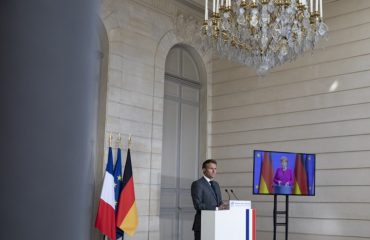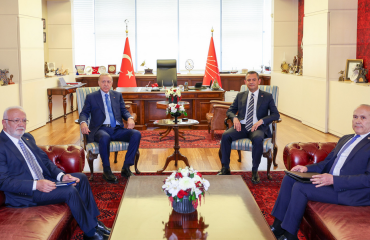
Turkish President Tayyip Erdoğan’s Syria warnings at the Parliament’s legislative year opening on October 1 were not something unexpected. It had already become clear, after the National Security Council (MGK) meeting on September 30 that he would give out a new message for the U.S. about the possibility of a Safe Zone in Syria and the outlawed Kurdistan Workers’ Party (PKK). What was surprising, however, was Erdoğan’s approach to a remark made by Erdoğan’s Justice and Development Party (AKP) member Faruk Çelik. In reference to the presidential elections, Çelik had said on September 29 that “Whoever gets 40 per cent on the first run should be elected; 50 percent +1 vote formula would tire Turkey”.
This was a possible gateway to change in the Presidential Government System, which was put in place in 2017 with the backing of the Nationalist Movement Party (MHP). When journalists asked about this, Erdoğan reluctantly stated that “it requires a change in the constitution”. However, “we can change this if we’re in it together, ruling party and opposition alike”, he added, as though he wanted to keep that new doorway ajar. The reporters pushed on, asking whether would AKP be the party to bring this proposal to the table at the parliament, to which Erdoğan responded simply by saying it was “the opposition’s job”. Though, the person asking this question was not from the opposition: he was an AKP member who had served in his government and recently been appointed to the Board of the public Ziraat Bank.
A reporter insisted on a clearer answer: did Erdoğan mean “we don’t need it, we’ll get 50+1 votes no matter what”? No, he didn’t mean that. He only meant that if the opposition was to bring up this issue at parliament, it would be discussed; he even was open to the opposition’s suggestions on this issue. The key point to take from this sentence is that Erdoğan is unsure about whether he’ll gather the 50+1 under any circumstance.
The local elections wound gets sorer by the day
The KONDA research and consultancy firm that had correctly forecasted that Republican People’s Party’s (CHP) Ekrem İmamoğlu would outscore AKP for the İstanbul municipality by 9 per cent in the revote of June 23. KONDA’s Director Bekir Ağırdır stated in an interview with T24 in earlier hours of October 1 that the AKP had regressed to the “lowest level in its voter base”. According to Ağırdır, the recent AKP-MHP coalition (The Nation Alliance), AKP’s influence had been reduced whilst the MHP gained more force.
The daily Cumhuriyet wrote on October 2 that according to data from 6 different research companies, the AKP-MHP coalition’s votes combined had dropped to below 50 per cent.
Faruk Çelik’s statement to the local Olay newspaper in Bursa was important for two reasons. Firstly, it was made following Vice President Fuat Oktay’s evaluation of the Presidential Government System’s first year. Secondly, there is the fact that the main subjects of the AKP exploratory meetings set to take place in Kızılcahamam on October 4-6 are the repeated defeats at the March 31 and June 23 local elections; or, to put it mildly, an assessment of the election results.
The foreign diplomats I have spoken to lately say that the impression they’ve gotten since the local election failures is that Erdoğan is on a political decline. Going for the option of the early election in such a climate where economic problems come piling up as the public bears its toll with ever-increasing prices is, of course, unrealistic. On the other hand, there is an increasing impression that MHP leader Devlet Bahçeli’s recipe of joining in on the government without winning an election is starting to make the AKP feel more and more trapped.
Erdoğan targeted the opposition, but his party was hit
The first reaction to Erdoğan came from his 2018 presidential elections rival Muharrem İnce of the CHP. İnce interpreted those words as the AKP’s way of saying “we won’t be able to reach that level of votes again so if I just lower the bar a little bit, I might get re-elected”. Aytun Çıray from Good Party (GP) said that “a discussion on the constitution should be wholistic” and that “we cannot discuss it clause-by-clause”.
CHP leader Kemal Kılıçdaroğlu, on the other hand, didn’t even bring the subject up in his address to his parliamentary group.
Whilst the CHP and GP saw the “40 per cent” talk as bait and steered clear, the AKP began discussing it. Parliamentary speaker Mustafa Şentop said that he was against changing the 50+1 formula. AKP’s Ömer Çelik stood closer to the opposition’s critiques and said that “going below 50 per cent will give off the impression that we work not for the people but the good of oursevles”. Çelik said the subject wasn’t in the AKP’s agenda; it was the idea of one of their members.
But Erdoğan’s words are still there: he said that they were open to constitutional change requests made by the opposition. Because Erdoğan has other, serious concerns.
Ahmet Davutoğlu and Ali Babacan’s speeding up of their processes to detach themselves from the AKP and found their parties was not the only blow AKP suffered as a result of the local elections. It also leads to an increasing discomfort concerning the need to have the MHP by their side; this includes the Kurdish voters steering away from AKP because of their links with the MHP.
So it looks like AKP can’t do with or without MHP. Erdoğan seems to be looking for a way to preserve his rule whilst getting rid of the obligation to side with MHP.


